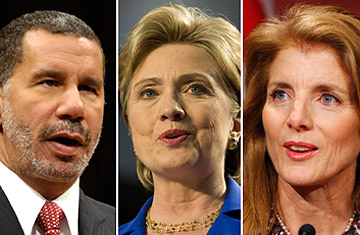
From left: David Paterson, Hillary Clinton and Caroline Kennedy
While the decision on who will replace Barack Obama in the U.S. Senate has been thrown into chaos with the arrest of Illinois Governor Rod Blagojevich, the speculation over who will fill another prominent Senate vacancy has temporarily been overshadowed. But the question of who will replace New York Senator Hillary Clinton, Obama's choice for Secretary of State, is shaping up as an even more intriguing drama of garden-variety politics and star power.
Headlines were made last week when Caroline Kennedy was reported to be considering the seat. The floating of her name was greeted by an initial flush of enthusiasm. "She would be fantastic," her cousin Robert F. Kennedy Jr. gushed to New York magazine. Caroline is a "strong possibility for the job," an unnamed family member told the New York Post, while New York City Mayor Michael Bloomberg opined, "Caroline Kennedy can do anything." Well, maybe she can — but whether she'll get the chance to is still an open question. (See pictures of TIME's J.F.K. covers.)
For the Empire State and its new governor, David Paterson, who will appoint Clinton's successor, there's a lot more to consider than just the Kennedy name — and the Kennedy family cheering section. A Dec. 9 Marist poll found that 25% of New York residents think Paterson should pick Kennedy vs. 25% favoring Andrew Cuomo, with the rest either divided among other candidates or "unsure." The poll also indicated the regional dynamic that Paterson faces; Kennedy polls stronger among New York City residents (29%) than upstate New Yorkers (22%). (See pictures of Robert F. Kennedy.)
New York, in terms of issues and political affiliation, is a state divided: the interests of the more rural, conservative voters in the New York State Thruway corridor (Buffalo, Rochester, Syracuse and Albany) are often opposed to those of the urban, liberal voters in the New York City area. Although Obama won the state with 62% of the vote, most upstate counties gave him only 45%-55%, while Manhattan, Brooklyn and the Bronx gave him 80%-90%. "The whole Caroline Kennedy thing is not a tip of the hat to upstate," says Joshua Dyck, an assistant professor of political science at SUNY Buffalo. "Here's a part of the state that already feels neglected."
John F. Kennedy's daughter, of course, would bring considerable star power to the job at a time when Paterson needs all the help in Washington he can get to win federal funds for the state's beleaguered budget. But whoever takes Clinton's seat would have to face voters in 2010, to fill out Clinton's term, and again in 2012, for re-election. And Kennedy, who has never run for office, may not be the strongest candidate against a tough Republican challenger. A Caroline Kennedy appointment "is fifty-fifty at best," says political consultant Hank Sheinkopf, a spokesman for state senate Democratic leader Malcolm A. Smith. "She has not run a statewide campaign. She has not run a local campaign. She has not been in combat, which is the state of politics in New York and anywhere else." (See pictures of J.F.K.'s early years.)
If he decides against Kennedy, Paterson could name an upstate candidate with downstate appeal, like popular Buffalo Mayor Byron Brown, an African-American Democrat who could win over liberal voters in New York City. (Brown garnered 6% overall in the Marist poll and 10% among upstate voters.) State Attorney General Andrew Cuomo, besides polling even with Kennedy in the Marist survey, offers Paterson another benefit. The "accidental" governor — who replaced Eliot Spitzer after his resignation amid a highly publicized sex scandal — will have to run for his own office in 2010, and Cuomo could be a formidable challenger in the Democratic primary. A Senate seat would presumably remove him from a potential gubernatorial run. On the other hand, Paterson could decide to pick a candidate with weaker statewide appeal, like New York City congresswoman Nydia Velazquez, in an attempt to chum the waters for the 2010 Senate election — luring formidable contenders like Cuomo and Rudy Giuliani into the race and away from a possible run at the governor's job.
And let's not forget the sentiments of New York's two current Senators, with whom Paterson needs strong partnerships. Chuck Schumer, the state's publicity-loving senior Senator who has been somewhat overshadowed by Clinton in recent years, may not appreciate Paterson replacing one political dynasty with another. Schumer has said he won't publicly endorse any potential candidates, but he reportedly favors Albany-area Congresswoman — and national unknown — Kirsten Gillibrand. As for Clinton, she may be less than enthralled with the prospect of her seat being filled by Caroline Kennedy — who enthusiastically stumped for Obama during the Democratic primary.
In the end, though, the decision will be Paterson's. Before becoming governor, he was a powerful state senator; used to the rough-and-tumble world of Albany politicking, he's unlikely to be bullied by the Kennedy family or anyone else. Says Sheinkopf: "He's not a guy who responds to that kind of pressure. He is extraordinarily smart and is political by birth. He will not cave."
